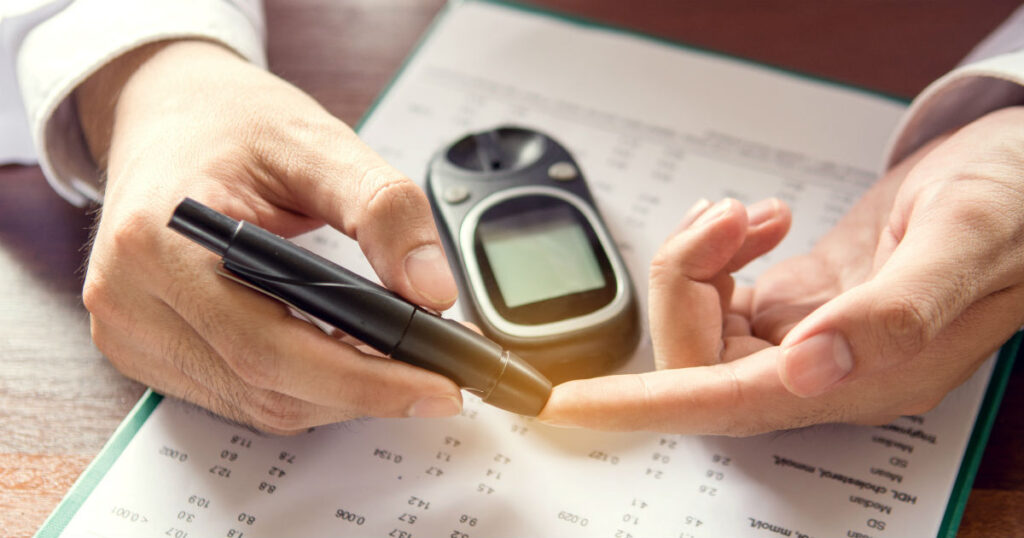Managing both diabetes and cancer effectively becomes even more daunting when they coexist in a patient. The interplay between diabetes and cancer treatments can complicate the management strategies for healthcare providers and require a careful, individualized approach. This guide explores the nuances of diabetes management in cancer patients, offering insights into the key challenges and practical strategies for integrated care, and tips for maintaining the best possible quality of life.
Contents
Common Challenges In Diabetes Management In Cancer Patients
 Managing diabetes in cancer patients presents a unique set of challenges due to the complex interplay between these two diseases and the effects of cancer treatments on diabetes management. Here are some of the common challenges faced in this dual diagnosis:
Managing diabetes in cancer patients presents a unique set of challenges due to the complex interplay between these two diseases and the effects of cancer treatments on diabetes management. Here are some of the common challenges faced in this dual diagnosis:
- Nutritional Challenges
Cancer patients often experience changes in appetite, taste alterations, and gastrointestinal symptoms that can make it difficult to maintain a consistent and balanced diet. This is crucial for diabetes management. The need to manage weight loss or gain, maintain muscle mass, and address nutritional deficiencies adds layers of complexity to dietary management.
- Physical Activity Limitations
Exercise is an important component of diabetes management. And, helping to control blood glucose levels and maintain overall health. However, cancer patients may face fatigue, pain, or physical limitations due to their illness or treatment side effects, limiting their ability to engage in regular physical activity.
- Increased Infection Risk
Both diabetes and some cancer treatments can weaken the immune system, increasing the risk of infections. Managing diabetes in a way that minimizes infection risk is crucial, as infections can complicate cancer treatment schedules and outcomes.
- Emotional and Psychological Stress
The psychological impact of dealing with cancer can influence diabetes management, as stress can affect blood glucose levels. Additionally, the emotional toll of managing two chronic conditions can lead to difficulties in maintaining consistent care routines.
- Medication Interactions and Side Effects
The potential for interactions between diabetes medications and cancer treatments can complicate management strategies. Some cancer medications may have side effects that influence blood sugar control or necessitate adjustments in diabetes medication dosages.
Addressing these challenges requires a multidisciplinary approach, tailored care plans, and close monitoring. This will help to ensure both diabetes and cancer are managed effectively, optimizing the patient’s quality of life and treatment outcomes.
What Is The Diabetes Management In Cancer Patients?
 Diabetes management in cancer patients requires a comprehensive, multidisciplinary approach due to the complex interactions between these two conditions and their treatments. Below, the key components of diabetes management in this patient population are elaborated upon:
Diabetes management in cancer patients requires a comprehensive, multidisciplinary approach due to the complex interactions between these two conditions and their treatments. Below, the key components of diabetes management in this patient population are elaborated upon:
Individualized Treatment Plans
Every patient’s experience with cancer and diabetes is unique, necessitating personalized treatment plans. These plans consider the specific type of cancer, the chosen cancer treatment regimen, the form of diabetes (Type 1 or Type 2), and the patient’s overall health status, including other comorbidities. Personalized plans may involve adjusting insulin types and dosages, modifying oral diabetes medications, and potentially introducing new treatments to manage hyperglycemia effectively.
Blood Glucose Monitoring
Intensive monitoring of blood glucose levels is crucial for adapting diabetes management strategies to the changing needs of cancer patients. Fluctuations in glucose levels can be caused by cancer itself, the stress of illness, and side effects of treatments like chemotherapy, steroids, or hormonal therapies. Regular monitoring helps in making timely adjustments to diabetes medications and dietary plans.
Dietary and Nutritional Support
A registered dietitian can provide valuable guidance on creating a nutrition plan that supports overall health while managing blood sugar levels. This plan must consider treatment side effects such as changes in taste, appetite loss, or gastrointestinal issues, which can significantly impact dietary intake and nutritional status. The diet should be rich in fruits, vegetables, whole grains, and lean proteins, with adjustments made to accommodate the patient’s preferences and tolerances.
Physical Activity
Exercise is beneficial for diabetes management but must be tailored to the individual capabilities and treatment schedule of the cancer patient. Physical activity can help improve insulin sensitivity, manage weight, and enhance quality of life. However, energy levels and physical abilities can vary greatly among cancer patients, requiring personalized exercise recommendations. Activities may range from daily walks and stretching to more structured exercise programs, as tolerated.
Medication Management
Effective diabetes management in the context of cancer treatment requires careful selection and adjustment of diabetes medications. Some cancer treatments can exacerbate hyperglycemia, necessitating changes in diabetes medication types and dosages. The healthcare team must closely monitor the patient for potential drug interactions and adjust treatment plans accordingly to manage side effects and ensure both conditions are managed optimally.
Management of Treatment Side Effects
Cancer treatments can have side effects that complicate diabetes management, such as increased risk of infection, fatigue, and fluctuations in blood sugar levels. Proactive management strategies include adjusting diabetes treatment to counteract these effects, monitoring for and treating infections promptly, and providing support for managing fatigue and other physical symptoms.
Emotional and Psychological Support
Dealing with cancer and diabetes simultaneously can be overwhelmingly stressful for patients and their families. Access to mental health support, including counseling and support groups, is essential for helping patients cope with the emotional burden of their dual diagnosis. Psychological support can also aid in adherence to treatment plans by addressing anxiety, depression, and other emotional barriers to effective self-care.
Coordination of Care
Coordinating care among the various healthcare providers involved in treating a cancer patient with diabetes is vital for ensuring that the management strategies for both conditions are harmonized. Regular communication between oncologists, endocrinologists, primary care physicians, dietitians, and diabetes educators is necessary to monitor the patient’s progress and make adjustments to treatment plans as needed.
Overall, diabetes management in cancer patients requires a holistic, patient-centered approach. Through personalized treatment plans, rigorous monitoring, and coordinated efforts among healthcare professionals, patients can achieve better health outcomes.
What Can Cancer Patients With Diabetes Eat?
 Cancer patients with diabetes face unique nutritional challenges due to the dual need to manage blood sugar levels while also supporting overall health and well-being during cancer treatment. Here are some dietary guidelines and suggestions for cancer patients with diabetes:
Cancer patients with diabetes face unique nutritional challenges due to the dual need to manage blood sugar levels while also supporting overall health and well-being during cancer treatment. Here are some dietary guidelines and suggestions for cancer patients with diabetes:
Focus on Whole Foods
- Fruits and Vegetables: Opt for a colorful variety of fruits and vegetables. These are high in vitamins, minerals, and fiber, which can help regulate blood sugar levels. Be mindful of portion sizes for fruits and certain starchy vegetables to keep carbohydrate intake in check.
- Whole Grains: Choose whole grains like quinoa, brown rice, oats, and barley. These provide essential nutrients and fiber, helping in blood sugar control.
Lean Protein Sources
Incorporate lean protein sources into your diet to support muscle maintenance and repair, which is particularly important during cancer treatment. Good options include:
- Plant-Based Proteins: Lentils, beans, chickpeas, and tofu.
- Lean Meats: Chicken, turkey, and lean cuts of beef or pork.
- Fish: Especially fatty fish rich in omega-3 fatty acids, such as salmon, mackerel, and sardines.
- Eggs and Low-Fat Dairy: These can also be good sources of protein.
Healthy Fats
Healthy fats are essential for overall health and can help absorb fat-soluble vitamins. Include sources of monounsaturated and polyunsaturated fats such as:
- Nuts and Seeds: Almonds, walnuts, flaxseeds, and chia seeds.
- Avocado: Rich in healthy fats and fiber.
- Olive Oil: Use in cooking or as a salad dressing base.
Manage Carbohydrate Intake
- Control Portions: Keep an eye on portions of carbohydrates to manage blood sugar levels effectively.
- Complex Carbohydrates: Opt for complex carbs over simple sugars and refined carbs. Complex carbs are found in whole grains, legumes, and vegetables, providing fiber that helps slow down glucose absorption.
Stay Hydrated
- Drink plenty of water throughout the day to stay hydrated. Limit sugary drinks and opt for water, herbal teas, or sugar-free beverages.
Dietary Adjustments for Treatment Side Effects
Cancer treatments can cause side effects such as nausea, vomiting, taste changes, or mouth sores, which might affect food intake and preferences. It’s important to:
- Adjust Texture: Soft foods or liquid meals (like smoothies or soups) might be easier to consume if experiencing mouth sores or difficulty swallowing.
- Flavor Enhancements: Use herbs, spices, or lemon juice to enhance flavors, especially if foods taste bland or metallic.
- Small, Frequent Meals: If experiencing nausea, try eating small, frequent meals instead of three large ones.
A balanced diet that supports diabetes management in cancer patients can vary widely among individuals, depending on their specific health needs, types of cancer, treatment regimens, and personal preferences. Tailored nutritional advice from healthcare professionals is invaluable in navigating these complex requirements.
Conclusion
Diabetes management in cancer patients presents a unique set of challenges, requiring a careful, personalized approach to care. From adjusting dietary habits to incorporating nutrient-dense to closely monitoring blood glucose levels and managing medication interactions, every aspect of care is vital. The importance of a supportive healthcare team, including oncologists, endocrinologists, dietitians, and diabetes educators, cannot be overstated.
Through a comprehensive, multidisciplinary approach, patients can navigate the complexities of managing diabetes during cancer treatment, aiming for the best quality of life. Do you want to get rid of diabetes? Join our online diabetes treatment program and reverse Diabetes naturally through lifestyle changes such as a Personalized Diet plan, Exercise, Yoga, dieticians, and health coaches.

